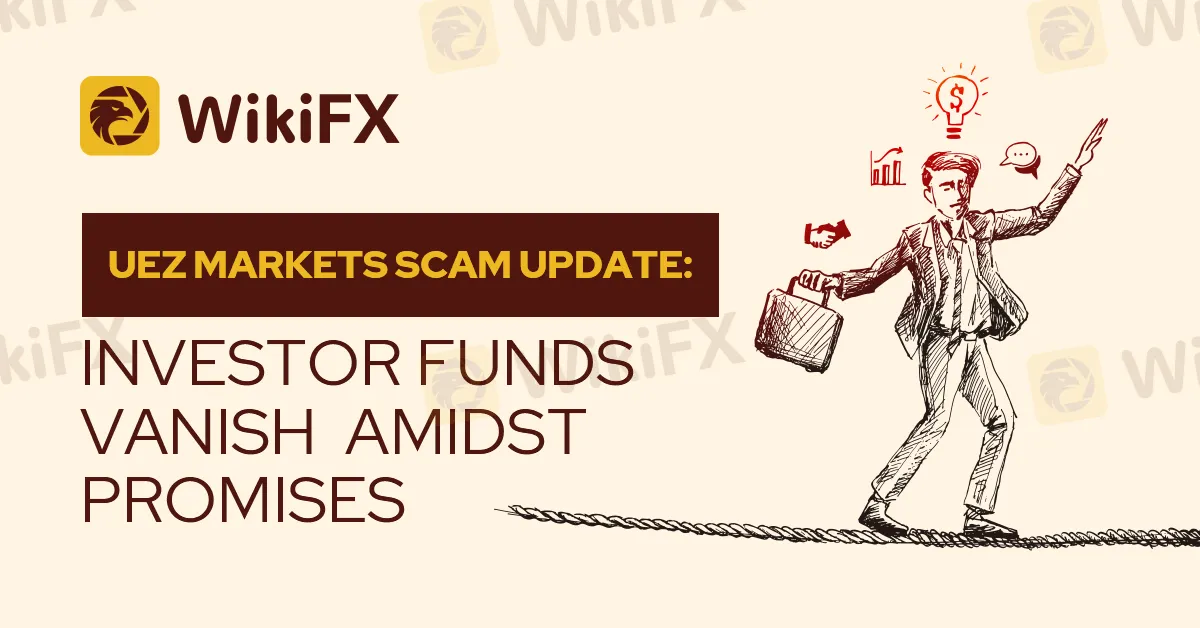Celebrate the New Year and Usher in a Safer 2026 for All Traders!
As the new year begins, WikiFX extends our sincere gratitude to traders worldwide, our industry partners, and all users who have consistently supported us.
简体中文
繁體中文
English
Pусский
日本語
ภาษาไทย
Tiếng Việt
Bahasa Indonesia
Español
हिन्दी
Filippiiniläinen
Français
Deutsch
Português
Türkçe
한국어
العربية
Abstract:A Nigerian investor named Horgan recently revealed his bad experience of falling victim to the UEZ Markets scam. This case has shed light on the perils of entrusting hard-earned money to fraudulent brokers who exploit investors’ trust and aspirations.

Case in Detail
A Nigerian investor named Horgan recently revealed his bad experience of falling victim to the UEZ Markets scam. This case has shed light on the perils of entrusting hard-earned money to fraudulent brokers who exploit investors trust and aspirations.
Guarantee of Returns
UEZ Markets, a broker operating in the financial market, lured investors like Horgan with the promise of substantial returns. For this victim, the prospect of entrusting his money to professionals who would purportedly trade on his behalf and generate daily profits seemed like a good idea. With such enticing assurances, it's no surprise that Horgan and many others were drawn in.
However, as time went on, it became clear that these promises were nothing more than a façade for a well-orchestrated scam. Despite months of waiting and anticipation, Horgan found himself unable to withdraw even a single penny of his invested funds. We think that his money was trapped in a scheme that seemed designed to make it disappear.
Below is evidence offered by the victim.



The Excuse from UEZ Markets
UEZ Markets eventually claimed that their system had been hacked. This declaration not only added to the confusion but also left investors like Horgan with a sense of powerlessness. The hacking narrative appeared to be a cover-up for the actual misappropriation of funds, conveniently diverting blame from the fraudulent activities of the broker itself.
What We Should Learn
Unrealistic Promises: Be wary of brokers or investment platforms that promise guaranteed profits or returns that seem too good to be true. Legitimate investments come with risks, and no one can predict constant gains.
Lack of Regulation: Always verify the regulatory status of a broker. Reputable brokers are usually regulated by relevant authorities, and this information should be readily available.
Withdrawal Difficulties: If you encounter significant obstacles when attempting to withdraw your funds, it's a red flag. Legitimate brokers prioritize facilitating easy withdrawals for their clients.
Inadequate Information: A lack of transparency about the company, its team, and its operations is cause for concern. Legitimate brokers are usually open about their background and operations.
Pressure to Invest: Be cautious if you're subjected to aggressive sales tactics or if you're pushed to invest more money than you're comfortable with.
Conclusion
The unfortunate story of Horgan serves as a sobering reminder of the risks associated with the financial industry. While the allure of quick and substantial returns can be captivating, it's imperative for investors to exercise caution and due diligence before committing their money to any venture.
WikiFX is actively reaching out to the victim and other traders hoping to find more evidence to help him resolve the problem. Please stay tuned for more information.
WikiFX keeps track of developments, providing instant updates on individual traders and helping investors avoid unscrupulous brokers. If you want to know whether a broker is safe or not, be sure to open WikiFXs official website (https://www.WikiFX.com/en) or download the WikiFX APP through this link (https://www.wikifx.com/en/download.html) to evaluate the safety and reliability of this broker!

Disclaimer:
The views in this article only represent the author's personal views, and do not constitute investment advice on this platform. This platform does not guarantee the accuracy, completeness and timeliness of the information in the article, and will not be liable for any loss caused by the use of or reliance on the information in the article.

As the new year begins, WikiFX extends our sincere gratitude to traders worldwide, our industry partners, and all users who have consistently supported us.

Dear Forex Traders, When choosing a forex broker, have you ever faced these dilemmas? Dozens of broker advertisements, but unsure which one is truly reliable? Online reviews are either promotional content or outdated/incomplete? Want to learn about real users’ deposit/withdrawal experiences but can’t find firsthand accounts? Now, your experience can help thousands of traders and earn you generous rewards! The campaign is long-term and you can join anytime.

Markets turn cautious as investors await the Fed’s December meeting minutes. The US Dollar stabilizes near 98.10, gold drops sharply from record highs, while GBP/USD, EUR/USD, and USD/JPY react to central bank signals.

Following the successful conclusion of the global public voting phase, the WikiFX Golden Insight Award has now officially entered its final evaluation stage—the expert judging. This marks a critical juncture in the 2025 Golden Insight Award selection process, ushering in the most authoritative and rigorous phase of professional assessment and industry consensus-building.
